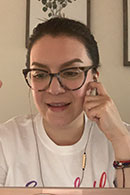MRC Student Provides Teletherapy During COVID-19 Pandemic

In the below question and answer session, Rehabilitation Counseling student and spring 2020 graduate Ana Molina describes her experience in providing teletherapy in her internship with community-based organization Project Search during the COVID-19 epidemic.
Please describe the services you provide for Project Search.
As a job skills trainer for Project Search, I serve young people with significant intellectual and developmental disabilities. Typically, these are high school students in an Individual Education Program (IEP) and in their last year of high school eligibility. Throughout the program year, I work with the interns (students) to help them acquire and develop employability and functional skills in a hospital setting (Hospitals of Providence). In addition, I facilitate learning in the following areas: team building, workplace safety, technology, maintaining employment, self-advocacy, financial literacy, health and wellness, and preparing for employment.
Through completion of three rotations during the year, the student interns acquire competitive, marketable, and transferable skills to enable them to apply for a related position. Interns also build communication, teamwork, and problem-solving skills, which are important to their overall development as a young worker. Additionally, I also provide work readiness services to high school students with disabilities in order to prepare them to excel in their abilities to successfully obtain and maintain competitive integrated employment.
How did you feel initially about the transition from in-person sessions with your clients to teletherapy?
Since our students are in a “high-risk” population, we were not able to return to the hospital, due to restrictions from the Hospitals of Providence, SISD, and the City of El Paso. Instead, I started working from home providing teletherapy services to the students on a weekly or daily basis.
I am very familiar with teletherapy, as I have provided this type of service to clients with mental health issues in the past. Therefore, when I was presented with this opportunity again, I felt excited and somewhat cautious. The population I serve has significant intellectual and developmental disabilities, and I was not sure if they were going to respond to the changes in a positive manner.
Fortunately, this was not the case! The students and their parents have been extremely cooperative and helpful during this transition, and we have been working closely as a team to continue assisting the students in maintaining their soft skills and hard skills.
How did you prepare for the transition?
The transition happened very fast, and in response to this issue, I had three to four days to meet with my team to plan our curriculum for the rest of the year and discuss what technology tools were available to the students for service delivery purposes.
What was the most challenging aspect of the transition?
The most challenging part of this transition was planning the lessons and trying to find real life hands-on activities that mimicked the tasks performed by the students at the hospital in their assigned departments (central supply, kitchen, linen, gift shop, etc.) while at home. Also, re-designing assessment tools, trying to re-establish a routine to help them create some sense of normalcy, and organizing and implementing the support systems necessary for this transition was a challenge.
Do you miss visiting with your clients in person? Is teletherapy something you would consider doing in the future?
I definitely miss working with the students in person. I miss the interactions with hospital staff and the daily conversations with all of them. Personally, I enjoy teletherapy and the flexibility that comes with it, although I find it to be less personal and somewhat stressful when trying to find a suitable environment for job coaching purposes.
To learn more about the Master of Rehabilitation Counseling Program, please visit: https://www.utep.edu/chs/mrc/
Go Miners!




